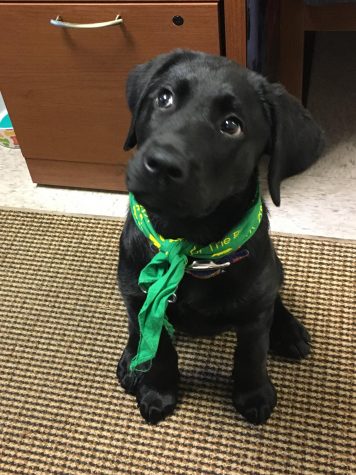(The Picket)- Dr. Amy DeWitt’s office looks more like a Petco than a sociology professor’s office
A dog crate is against the back wall, dog treats crowd her desk, and squeaky toys litter the floor.
DeWitt trains dogs for Guide Dogs for the Blind, and her newest student is Vosco, a 3-month-old black Labrador.

“Training the dogs and passing them on for their bigger purpose, is the hardest part of my volunteering,” she said.
Vosco is the second dog DeWitt has trained. Her first trainee, Luther, who was also a black Lab, graduated from the program a few months ago.
Not only does Vosco live with DeWitt, he follows her around campus on a leash.
As Vosco’s trainer, she socializes him and teaches him basic commands. She teaches him not to get onto furniture, steal shoes or socks, how to sit, lie down, and keep all four paws on the ground at all times. She also teaches him to be quiet, to sit on a bus, to walk beside her and how to interact with other people and dogs.
She will keep Vosco, as she did Luther, for a year. The dogs then go for a year-long training with the guide dogs program. Then, they are ready for their future owner.
Luther went to a blind college student in Arkansas. DeWitt knew that Luther and the female student were a “perfect match.” They were compatible she said, they even sleep in the same bed.
“It takes a very special dog to be able to think independently and guide a [blind] person,” DeWitt said. While Labradors are preferred, German Shepherds are also used.
The hardest part of training “is giving the dogs back,” she said. Dogs who don’t succeed as guide dogs may go into law enforcement, or help children with autism, she said.
As DeWitt spoke, Vosco demolished a plastic bowl, and searched for other items to chew. To distract him, DeWitt threw his peanut squeaky toy in the hall.
Listen to Vosco and his squeaky toy here.

Leave a Reply